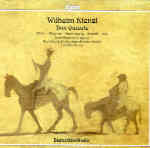Not exactly a household-name, Wilhelm Kienzl is known mostly for his opera Der Evangeliman, which was premiered in Berlin in 1895 and performed more than 5,000 times during the following four decades. Occasionally an aria or two will appear on a baritone’s or tenor’s recital CD; otherwise Kienzl has all but disappeared. But here we have a new recording of his 202-minute, gigantically orchestrated Don Quixote (multiple woodwinds, cow horns, four guitars, two harps, eight trumpets, eight horns, castanets, huge complement of strings), a terrible flop at its premiere in 1898, but reportedly a great success when the live performances surrounding this recording took place, also in Berlin, in 1998.
You hear every late Romantic composer except Wagner in Kienzl’s score–no Leitmotifs, no hint of “that chord”. Indeed, Kienzl made a point of avoiding Wagnerisms and wanted to get back to Mozart. He doesn’t, although there are fine set pieces, trios, quartets, and ensembles. Occasionally Marschner’s Der Vampyr pops up; so does Schumann at his grandest (the Rhenish Symphony), and I’m sure other listeners will find all of the less experimental (i.e., French) composers of the last quarter of the 19th century represented. Despite this, in its mixture of comic and serious elements (which nicely capture Cervantes’ tone), Kienzl’s work has an ambience all its own. Even when it is far too busy, as in some of the comic scenes (Act 2, scene 4, in which a band of men sing in falsetto, impersonating women, as Quixote is prepared for a shave) there is coherence. You get the impression that much of this would work brilliantly on stage, and the characters are vividly drawn. There are several purely orchestral moments as well–scene changes, preludes, a ballet–and each is admirable for its expressiveness and fine orchestration.
The performance is mostly wonderful. Thomas Mohr, in the seemingly endless role of Quixote, has a big, gleaming, obviously tireless baritone, and he’s very much involved in the character’s lunacy and loveableness. James Wagner, as Sancho Pansa, sings the character role without mugging, and gains our sympathy for his loyalty to the Don. A mezzo named Michelle Breedt sings Mercedes, Quixote’s niece, and while not possessing a particularly lovely sound, she also impresses. Carrasco, Mercedes’ love and one of the plot’s instigators, is sung by baritone Matthias Hennenberg, who is required to impersonate an elderly noblewoman at one point and sings lengthy passages in falsetto.
The remainder of the large cast (there are 18 solo roles) is very good, clearly involved in a project that they find worthy. Gustav Kuhn and his Berlin Radio forces make as persuasive a case for this opera as possible: without exactly getting a handle on anything particularly original or hummable, I found myself interested, a scene or two or three at a time. Full libretto and scene-by-scene synopsis (and copious notes) are included, and the sound is very good. This won’t change your life–or even convince you that a lost masterpiece has been found; but it’s a big, juicy work, with lots to admire.
































